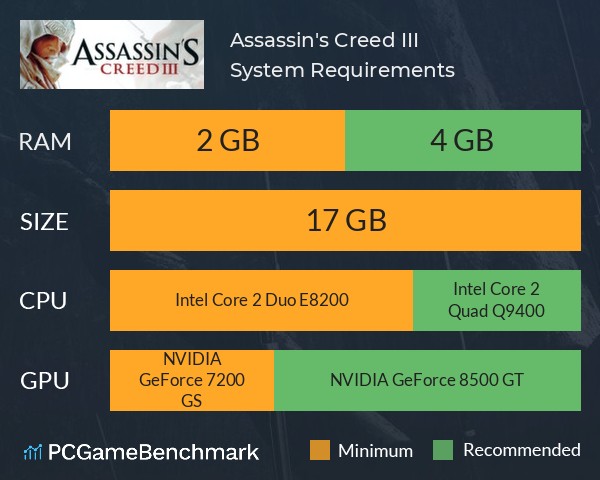If you’re a fan of Assassin’s Creed and wondering if your PC can handle the game, you’re not alone.
A 2GHz processor can run older Assassin’s Creed games, but for newer titles like Odyssey or Valhalla, a faster CPU (3GHz or higher) and better specs are recommended for smooth gameplay.
This guide will explain what you need to know about processor speeds, system requirements, and how to get the best performance.
Understanding Processor Requirements for Gaming
1. Role of CPU in Gaming Performance
The CPU (Central Processing Unit) is like the brain of your computer. It controls everything in the game, including character movements, AI, and background processes.
A fast CPU helps the game run smoothly without lag. Some games rely more on the graphics card (GPU), but open-world games like Assassin’s Creed need a strong CPU too. If your processor is too slow, the game may freeze, stutter, or take longer to load, making it hard to play.
2. GHz vs. CPU Architecture
Many people think a higher GHz (gigahertz) number means a better CPU, but that’s not always true. A modern 2GHz processor is much faster than an old 2GHz processor because new CPUs have better technology.
The number of cores also matters—a quad-core processor (4 cores) is better than a dual-core (2 cores) at the same speed. So, it’s not just about GHz but also how new and powerful the processor’s design is.
Assassin’s Creed Games and Their System Requirements

1. Assassin’s Creed 1 & 2
- Minimum CPU: 1.8GHz Dual-Core
- Recommended CPU: 2.6GHz Dual-Core
- RAM: 2GB (minimum), 4GB (recommended)
- Graphics Card: 256MB VRAM (minimum), 512MB VRAM (recommended)
- Storage: Around 8-10GB
These are older games, so a 2GHz processor should work fine. However, if your CPU is too old, you might experience some lag. Lowering graphics settings can help improve performance.
2. Assassin’s Creed Brotherhood & Revelations
- Minimum CPU: 1.8GHz Dual-Core
- Recommended CPU: 2.4GHz Dual-Core
- RAM: 2GB (minimum), 4GB (recommended)
- Graphics Card: 512MB VRAM (minimum), 1GB VRAM (recommended)
- Storage: Around 10-12GB
These games are slightly more demanding than AC2 but should still be playable on a 2GHz processor, especially if you have a good GPU and enough RAM.
3. Assassin’s Creed III & IV: Black Flag
- Minimum CPU: 2.5GHz Dual-Core
- Recommended CPU: 3.0GHz Quad-Core
- RAM: 4GB (minimum), 8GB (recommended)
- Graphics Card: 512MB VRAM (minimum), 2GB VRAM (recommended)
- Storage: Around 16-30GB
A 2GHz processor will struggle with these games, especially in busy areas. You might experience lag and slow loading times. A better CPU is recommended for smooth gameplay.
Read Out: Intel Xeon Gold Processors List: A Detailed Overview 2025!
4. Assassin’s Creed Unity & Syndicate
- Minimum CPU: 3.3GHz Quad-Core
- Recommended CPU: 4.0GHz Quad-Core
- RAM: 6GB (minimum), 8GB+ (recommended)
- Graphics Card: 2GB VRAM (minimum), 4GB VRAM (recommended)
- Storage: 50GB+
These games are very demanding. A 2GHz processor is not enough to run them properly. You will likely face lag, freezing, and slow performance even on the lowest settings.
5. Assassin’s Creed Origins, Odyssey, and Valhalla
- Minimum CPU: 3.2GHz Quad-Core
- Recommended CPU: 4.0GHz Six-Core or better
- RAM: 8GB (minimum), 16GB (recommended)
- Graphics Card: 2GB VRAM (minimum), 6GB+ VRAM (recommended)
- Storage: 50-100GB
Modern Assassin’s Creed games need a very powerful CPU and GPU. A 2GHz processor is far too weak to run them, even with all settings on low.
Factors Affecting Performance on a 2GHz Processor
A 2GHz processor alone doesn’t decide how well a game will run. Other hardware components and software optimizations play a big role in gaming performance. Here are the key factors that affect how Assassin’s Creed will perform on a 2GHz processor.
1. CPU Architecture Matters More Than Just GHz
Not all 2GHz processors are the same. A modern 2GHz quad-core processor (like an Intel i5 or Ryzen 5) is much faster than an old 2GHz dual-core CPU. Newer CPUs have better efficiency, more cache, and improved performance, allowing them to handle games much better.
2. Number of Cores and Threads
Games like Assassin’s Creed require multi-core processors for smooth performance. If your 2GHz processor has only one or two cores, it may struggle to handle the game, causing lag and slowdowns. A quad-core or higher CPU is much better for gaming.
3. GPU (Graphics Card) Power
The GPU (graphics card) is just as important as the processor for gaming. Even a fast processor won’t help much if you have a low-end GPU. A good GPU can take some workload off the CPU, making the game run better.
mes need a lot of memory (RAM) to run smoothly. If your PC has only 4GB RAM, it might struggle with newer Assassin’s Creed games. 8GB or more is recommended to prevent lag and long loading times. Faster RAM can also improve performance.
5. Game Optimization and Settings

Lowering the graphics settings in Assassin’s Creed can help the game run better on a weak CPU. Reducing resolution, disabling shadows, and lowering texture quality can improve frame rates. Some older AC games also have fan-made patches to improve performance on low-end PCs.
6. Background Applications and Processes
Too many programs running in the background (like Chrome, antivirus software, or system updates) will take up CPU power. Closing unnecessary applications before playing can free up processing power and improve performance.
7. Hard Drive vs. SSD
Games load much faster on an SSD than on a traditional hard drive (HDD). If your game is installed on an HDD, loading times might be slow, and performance could suffer. Upgrading to an SSD can make a big difference.
8. Overclocking the CPU
Some CPUs allow overclocking, increasing the GHz speed beyond the default limit. Overclocking a 2GHz processor to 2.5GHz or higher can improve performance but also increase heat and power consumption. Proper cooling is needed to prevent overheating.
Minimum CPU Requirements For Several Assassin’s Creed Titles (Quick Reference Table)
| Title | Typical minimum CPU listed | How a 2.0 GHz CPU stacks up |
| Assassin’s Creed (original) — Director’s Cut | Dual-core 2.6 GHz (Pentium D / Athlon X2) — recommended Core 2 Duo 2.2 GHz. | A 2.0 GHz modern dual-core might run it at low settings; older 2.0 GHz chips likely struggle. |
| Assassin’s Creed II | Intel Core 2 Duo 1.8 GHz (minimum) — recommended E6700 2.6 GHz. | Most 2.0 GHz dual-core CPUs meet the minimum for AC II; playable at low/medium depending on GPU. |
| Assassin’s Creed: Origins | Intel Core i5-2400S 2.5 GHz (minimum). | 2.0 GHz is below Ubisoft’s min — unlikely to be playable unless heavily modded and GPU is strong. |
| Assassin’s Creed Odyssey | Intel Core i5-2400 @ 3.1 GHz (minimum listed as ~3.1). | 2.0 GHz will not meet the minimum; expect very poor performance. |
| Assassin’s Creed Shadows (latest) | Intel i5-11600K / Ryzen 5 5600X class (3.7–3.9 GHz suggested). | 2.0 GHz is far below recommended — not playable for modern entries. |
(Those minimums come from official pages and major requirement databases — use them as a baseline.)
Alternative Solutions If Your CPU Is Too Weak
If your 2GHz processor is struggling to run Assassin’s Creed, here are some alternative solutions to improve your gaming experience:
- Play Older Assassin’s Creed Games – Stick to Assassin’s Creed 1, 2, Brotherhood, and Revelations, which have lower system requirements and run better on weaker CPUs.
- Lower Graphics Settings – Reduce resolution, disable shadows, and lower texture quality to improve performance on a low-end processor.
- Use Game Booster Software – Programs like Razer Cortex or Wise Game Booster can free up system resources and improve performance.
- Close Background Programs – Shut down unnecessary applications like Chrome, Discord, and antivirus software to free up CPU power.
- Upgrade Your RAM – Adding more RAM (at least 8GB) can help reduce lag and improve performance in Assassin’s Creed games.
- Upgrade Your Graphics Card – A better GPU can take some workload off your CPU and help improve gaming performance.
- Use Cloud Gaming Services – Platforms like NVIDIA GeForce Now, Xbox Cloud Gaming, and PlayStation Plus allow you to stream Assassin’s Creed without needing a powerful CPU.
- Try Lightweight Operating Systems – Installing a lighter OS (like Linux or a fresh Windows install) can improve overall system speed and gaming performance.
Assassin’s Creed 1 System Requirements PC
Assassin’s Creed 1 needs at least a 1.8GHz Dual-Core processor, 2GB RAM, and a 256MB graphics card. A better PC with a 2.6GHz CPU, 4GB RAM, and 512MB GPU will give smoother gameplay. Around 8GB of storage is required.
Must Know:v32 Bit Apps Can Only Run On 32 Bit Processors: Guidance!
Assassin’s Creed 2 System Requirements
Assassin’s Creed 2 requires a 1.8GHz Dual-Core CPU, 2GB RAM, and a 256MB graphics card. A 2.4GHz Dual-Core CPU, 4GB RAM, and a 512MB graphics card are recommended for better performance. The game needs at least 8GB of free storage.
Can I Run Assassin’s Creed 1 Without a Graphics Card?
No, Assassin’s Creed 1 needs a graphics card to run. Integrated graphics might work, but the game will lag a lot. A basic 256MB dedicated GPU is required to play smoothly without too many performance issues.
Assassin’s Creed System Requirements
Different Assassin’s Creed games have different system requirements. Older games like AC1 need a 1.8GHz CPU, 2GB RAM, and a 256MB GPU. Newer games like Valhalla require a 3.2GHz CPU, 8GB RAM, and a strong graphics card.
Assassin’s Creed 3 System Requirements PC

To run Assassin’s Creed 3, you need a 2.5GHz Dual-Core CPU, 2GB RAM, and a 512MB graphics card. A 3.0GHz Quad-Core CPU, 4GB RAM, and a 1GB GPU are recommended for better performance. The game requires 17GB of storage.
Assassin’s Creed 2009 System Requirements
Assassin’s Creed games released in 2009 (like Assassin’s Creed 2) require a 1.8GHz CPU, 2GB RAM, and a 256MB graphics card. A better experience comes with a 2.4GHz CPU, 4GB RAM, and a 512MB GPU. Storage needed is around 8GB.
FAQs
1. Is 2 GHz Processor Speed Good for Gaming?
A 2GHz processor is okay for old games but too slow for modern ones. A faster CPU with more cores is better.
2. What CPU Do You Need for Assassin’s Creed?
Older Assassin’s Creed games need a Dual-Core CPU, while newer ones require at least a Quad-Core or better processor.
3. Can I Play Assassin’s Creed on a Low-End PC?
Yes, but only older games like AC1 and AC2. Newer games need a powerful CPU, more RAM, and a good GPU.
4. Can I Run Assassin’s Creed Unity on a Low-End PC?
No, Unity is very demanding. It needs a strong Quad-Core CPU, at least 6GB RAM, and a good graphics card.
5. Is 2 or 5 GHz Better for Gaming?
5GHz is better because it’s faster, but CPU architecture matters too. A modern 2GHz processor can still outperform an old 5GHz one.
6. What are the minimum requirements for Assassin’s Creed 2 PC?
Assassin’s Creed 2 needs at least a dual-core 1.8 GHz processor, 2 GB RAM, DirectX 9 graphics card with 256 MB, and Windows XP or newer.
7. Can I run Assassin’s Creed 2 without a graphics card?
Without a dedicated graphics card, Assassin’s Creed 2 won’t run smoothly. Integrated graphics might start it, but gameplay will lag badly, making the experience frustrating overall.
8. How much RAM do you need for Assassin’s Creed?
Most older Assassin’s Creed games need 2 GB RAM minimum, while newer ones often require 8 GB or more to run smoothly without stuttering or crashes.
9. Can Assassin’s Creed run on a laptop?
Yes, Assassin’s Creed can run on many laptops. However, performance depends on having at least a decent processor, dedicated graphics card, and enough RAM installed.
10. What devices can you play Assassin’s Creed on?
You can play Assassin’s Creed on PC, PlayStation, Xbox, and even some cloud platforms. Availability depends on the game version and system compatibility requirements.
Conclusion
In conclusion, while a 2GHz processor can handle older Assassin’s Creed games, modern titles like Unity, Odyssey, and Valhalla require much more power. Upgrade your CPU, GPU, and RAM for smooth performance is recommended, or consider alternative solutions.















